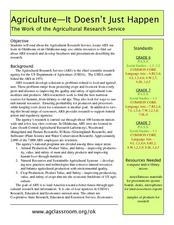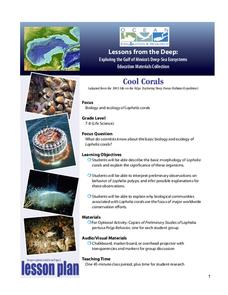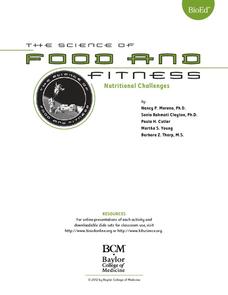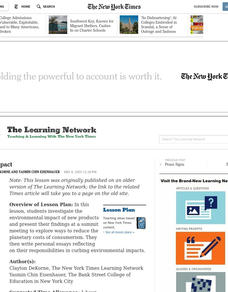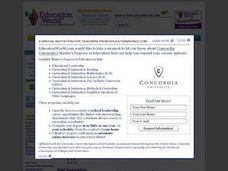Curated OER
Forest Food Webs
Students consider the interdependency of life in a temperate forest by studying selected organisms from an Asian temperate forest and creating a food web.
Curated OER
Insect Travel Brochure
Seventh graders explain what a trophic level is and how different organisms fit into different trophic levels. They observes different insect habitats and find reasons for why some habitats may be better suited for insects, than other...
Curated OER
Agriculture: It Doesn't Just Happen
After reading an informational text on the Agricultural Research Service, learners research the role of the ARS in Oklahoma. Using reputable online sources, they label a map of the state with relevant areas. Researchers focus on one of...
Baylor College
Serving Sizes
Are serving sizes for different foods always appropriate for what you need? In this hands-on activity, learners work in groups to estimate what one serving size of various foods are, and then evaluate their hypotheses by measuring real...
NASA
Biology Training Conclusion
Gravity is just one consideration when determining human habitability on a new planet. The lesson connects four different units and starts with connecting the various systems: planetary systems, human body systems, etc. After scholars...
Curated OER
Tell Us All: Tools for Integrating Math and Engineering
What a scam! Middle and high schoolers pose as journalists exposing consumer fraud. In this lesson, they write an article for a magazine using data collected during previous investigations (prior lessons) to defend their findings that a...
Curated OER
Food Chains and Food Webs
Students discuss the characteristics of producers, consumers and decomposers. Using a flow chart, they construct a food chain to visually show how organisms with different energy sources depend upon one another. Students explore a...
Curated OER
Let's Create an Ecosystem
Seventh graders discover how an ecosystem works by creating one in class. In this Earth science lesson, 7th graders study vocabulary terms associated with ecosystem and read environment handouts. Students create an observatory...
Curated OER
Ocean Market
Middle schoolers identify some consumer goods that come from the ocean.
They classify these items into groups, identify their source, and calculate the cost of buying such goods.
University of Kentucky
Beneficial Bug Scavenger Hunt
Many people think of bugs as annoying pests to be squashed, but most insects and spiders are beneficial, eating the actual pests or pollinating plants. After reviewing some of the common bugs in your area (they may differ from those...
National Wildlife Federation
Master P in the House: An All School Energy and Climate Change Plan
A person in the US uses 20 times more energy than a person in India—that's a drastic difference! The final lesson in the 12-part series goes back to the initial energy audits, analyzes which room showed the most conservation of energy,...
Forest Foundation
Fire - How Does it Relate to You?
Forest fires can be a necessary step in keeping a forest healthy, but what happens when they get out of control? Learners investigate the causes and effects of forest fires in two specific areas, culminating in a report about the ways...
NOAA
Seafood and Human Health
Whether your young biologists realize it or not, humans play a significant role in marine ecosystems. To help them understand this fact children first create graphical representations that show homo sapiens' place in marine food chains,...
NOAA
Deep-Sea Ecosystems – Cool Corals
Young oceanographers research deep sea corals that thrive on chemosynthesis. The lesson plan focuses on the biology of the animal, preferred habitat, associations, and interactions.
NOAA
Deep-Sea Ecosystems – Life is Weird!
A pool of brine in the deep sea can be up to four times as salty as the surrounding sea water. The deep sea ecosystem relies on chemosynthesis and the organisms that live there are often strange to us. The lesson focuses on researching...
BioEd Online
Nutritional Challenges
Eating healthy can be a challenge, especially for people with special dietary needs. After learning about standard nutritional needs for adults, learners take on the role of a dietician and work together to create a menu for one of the...
Curated OER
Deep Impact
How can acknowledging opposing viewpoints reinforce one's argument? Use this New York Times lesson to study consumerism and the environmental impact of new products. After reading the article "Whether a Hummer or a Hybrid, the Big...
Curated OER
Sexual Health and Hygiene
By examining harmful health and hygiene practices, teens will be able to determine what is best for their body. Advertisers for health/hygiene products will also be evaluated for "best interest" criteria. The class will begin by...
Texas State Energy Conservation Office
Creating an Advertisement
Advertising for the purpose of influencing public policy regarding the use of alternative fuels is the focus of an innovative and engaging lesson. Learners are split up into six team in order to create an advertising campaign that...
Curated OER
A Model for Natural Selection- Spaghetti Worms
Does the early bird really get the worm? If so, which color of worm does it prefer? In an exciting and easy week-long field investigation, young field biologists set up a one square meter feeding area for birds. If you have a webcam,...
Global Change
Impact of a Changing Climate on the Pacific Walrus
How many of us can say they've seen a Pacific walrus? Not many and one of the reasons is the impact of climate change on their aquatic environment. Children get to think about the food web of the Bering Sea by creating an actual web with...
Curated OER
Make A Mummy: The Science of Mummification
Students research the history of mummification. They work together to create an apple mummy. They write a paragraph about what they gathered while doing the experiment.
Curated OER
Science
Students read labels of candy bars. For this ingredients lesson, students examine a variety of candy bar labels to determine the contents. Students research to find additional information on each candy bar, then write an opinion article...
Curated OER
Step by Step
Learners explore agriculture by creating a food production diagram. In this farming instructional activity, students read assigned text about the entities that assist in food production companies such as farmers, truckers and...
Other popular searches
- Family and Consumer Sciences
- Family Consumer Science
- Consumer Science Foods
- Consumer Science Manners
- Health and Consumer Science
- Consumer Science Fibers
- Consumer Science Fibres
- Fm & Consumer Science
- Family & Consumer Sciences
- Consumer Science Fib Res
- Consumer Science Careers
- Food and Consumer Sciences




